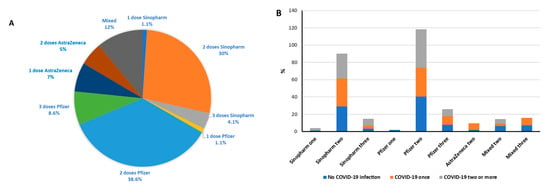The Safety and Immunogenicity of the Bivalent Omicron-Containing mRNA-1273.214 Booster Vaccine
A topical collection in Vaccines (ISSN 2076-393X). This collection belongs to the section "Vaccine Efficacy and Safety".
Viewed by 3003Editors
Interests: infection and immunity; immunotherapy; check-point inhibitors and stimulators; T cell response against SARS-CoV-2; viral immunity; translational research; clinical trials; bacterial and viral vaccines; immune mechanism behind antivirals; host-pathogen immunology
Special Issues, Collections and Topics in MDPI journals
Interests: human infectious diseases; viral infections; B- and T-cell immunology; vaccine/therapeutic development; mouse model development
Special Issues, Collections and Topics in MDPI journals
Topical Collection Information
Dear Colleagues,
A bivalent vaccine from Moderna based on omicron BA.1 was approved for use as a booster dose by the Medicines and Healthcare Products Regulatory Agency. Preliminary data indicated that the vaccine generates a strong immune response against the BA.4 and BA.5 subvariants, which are now dominant worldwide. This new proposal behaves in the same manner as a flu-like situation, where everyone must take their flu vaccine at the start of winter each year and the composition of the vaccine is regularly modified in accordance with circulating strains. The new vaccines are highly effective in preventing disease severity but not transmission. We are pleased to invite you to submit to this Topical Collection for all kinds of manuscripts, such as research articles, brief reports, and communications to promote the knowledge and discussion about COVID-19 vaccines, especially bivalent vaccines. The invited papers broadly cover the safety and immunogenicity of COVID-19 vaccines in normal healthy persons, persons with moderate immunocompromised status and persons with severe immunocompromised status.
Dr. Lalit Batra
Dr. Shailendra Kumar Verma
Collection Editors
Manuscript Submission Information
Manuscripts should be submitted online at www.mdpi.com by registering and logging in to this website. Once you are registered, click here to go to the submission form. Manuscripts can be submitted until the deadline. All submissions that pass pre-check are peer-reviewed. Accepted papers will be published continuously in the journal (as soon as accepted) and will be listed together on the collection website. Research articles, review articles as well as short communications are invited. For planned papers, a title and short abstract (about 100 words) can be sent to the Editorial Office for announcement on this website.
Submitted manuscripts should not have been published previously, nor be under consideration for publication elsewhere (except conference proceedings papers). All manuscripts are thoroughly refereed through a single-blind peer-review process. A guide for authors and other relevant information for submission of manuscripts is available on the Instructions for Authors page. Vaccines is an international peer-reviewed open access monthly journal published by MDPI.
Please visit the Instructions for Authors page before submitting a manuscript. The Article Processing Charge (APC) for publication in this open access journal is 2700 CHF (Swiss Francs). Submitted papers should be well formatted and use good English. Authors may use MDPI's English editing service prior to publication or during author revisions.








